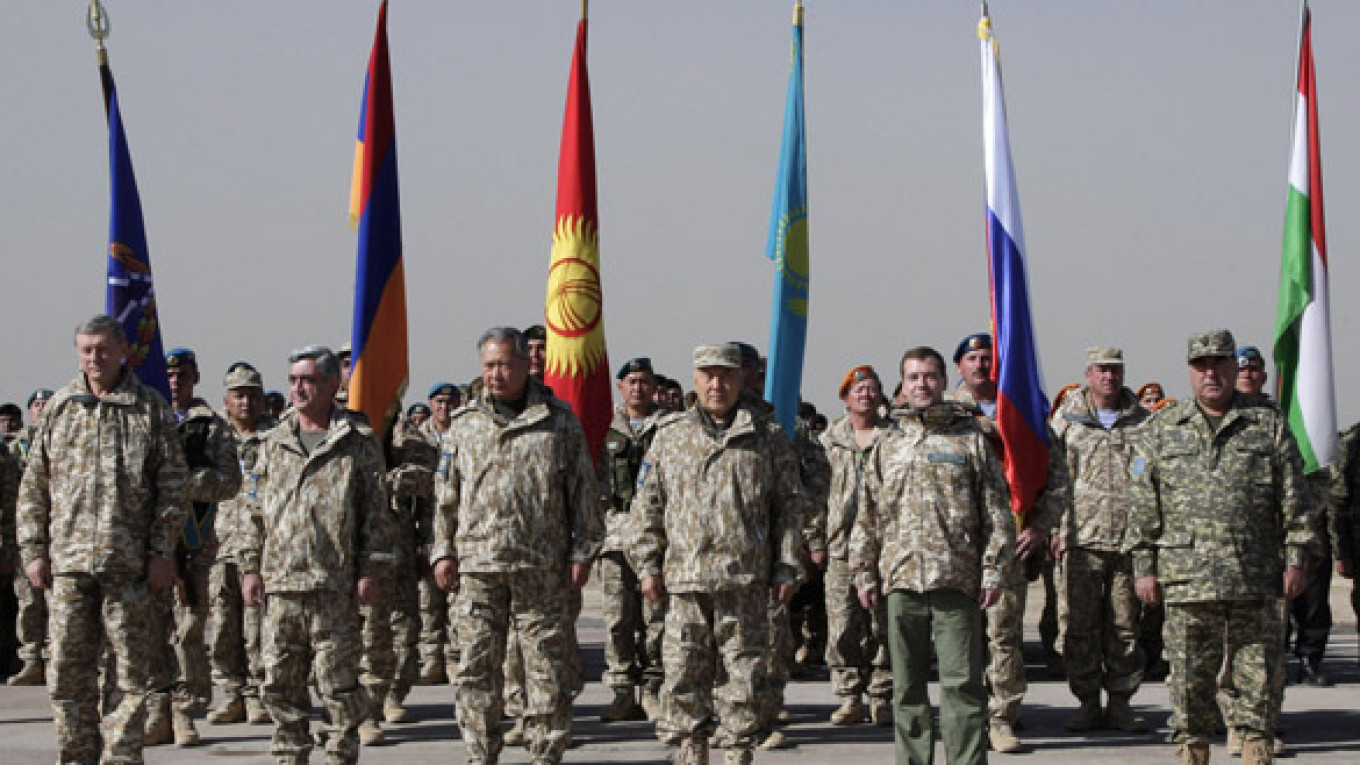MATYBULAK, Kazakhstan — Russia and four other former Soviet republics staged war games Friday to showcase a new NATO-style rapid reaction force designed to cement Moscow’s hold over allies in Central Asia and the Caucasus.
Dressed in combat fatigues, the leaders of Russia, Armenia, Kazakhstan, Kyrgyzstan and Tajikistan looked on as the force carried out a mock attack to destroy “insurgents” who had taken control of a chemical plant.
Smoke rose from a dew-drenched firing range in the Kazakh steppe, revealing paratroopers landing from helicopters and storming a building to rescue hostages.
President Dmitry Medvedev arrived at the Soviet-era firing range in a helicopter, and he and the other leaders wore desert-style camouflage uniforms created by fashion designer Valentin Yudashkin.
Russia is building up the Collective Security Treaty Organization, or CSTO, a military alliance among former Soviet republics, as a counterweight to NATO. The organization commits members to defend each other if attacked.
“This is our answer to those threats that our states are coming up against, threats that know no borders — drug crime, religious radicalism and several other threats which we all intend to battle,” Medvedev told reporters. “This is a milestone in the development of the CSTO and our cooperation.”
Five CSTO members agreed to create the rapid reaction force in February, when Medvedev said the units should be comparable to NATO structures.
Officials said 7,000 troops and 90 aircraft took part in the “Interaction-2009” drills, which covered an area of 1,600 square kilometers at the Matybulak firing range in southern Kazakhstan.
After inspecting troops and weapons, Medvedev and the other leaders moved to a two-story brick command center where they watched the exercises for 90 minutes through binoculars.
“We created this organization to repel aggression on any member of this organization, to [fight] extremists, terrorists, drug trafficking and other kinds of extremism,” Kazakh President Nursultan Nazarbayev told reporters after the maneuvers.
Belarussian President Alexander Lukashenko and Uzbek President Islam Karimov were absent. Although their countries are members of the CSTO, they have declined to join the rapid reaction force.
Lukashenko’s ties with Moscow have soured over trade disputes and anger at Russia’s refusal to lend Belarus more money. Karimov has been irked by Russian plans to build a military base in Kyrgyzstan near Uzbekistan’s eastern border.
A Message from The Moscow Times:
Dear readers,
We are facing unprecedented challenges. Russia's Prosecutor General's Office has designated The Moscow Times as an "undesirable" organization, criminalizing our work and putting our staff at risk of prosecution. This follows our earlier unjust labeling as a "foreign agent."
These actions are direct attempts to silence independent journalism in Russia. The authorities claim our work "discredits the decisions of the Russian leadership." We see things differently: we strive to provide accurate, unbiased reporting on Russia.
We, the journalists of The Moscow Times, refuse to be silenced. But to continue our work, we need your help.
Your support, no matter how small, makes a world of difference. If you can, please support us monthly starting from just $2. It's quick to set up, and every contribution makes a significant impact.
By supporting The Moscow Times, you're defending open, independent journalism in the face of repression. Thank you for standing with us.
Remind me later.


